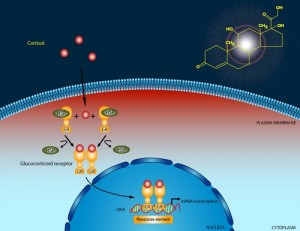Aberrant Cell Pathways Lead to Scleroderma Skin Manifestations

 Systemic sclerosis, often characterized by thickened skin and connective tissue, may be a result of increased signaling pathways. According to a study from University College London Medical School and the Musculoskeletal Biology University of Liverpool, published online ahead of print in Arthritis & Rheumatism, an increase in mTOR/AKT signaling leads to the inability to degrade the protein JunB, which then leads to increased production of connective tissue components.
Systemic sclerosis, often characterized by thickened skin and connective tissue, may be a result of increased signaling pathways. According to a study from University College London Medical School and the Musculoskeletal Biology University of Liverpool, published online ahead of print in Arthritis & Rheumatism, an increase in mTOR/AKT signaling leads to the inability to degrade the protein JunB, which then leads to increased production of connective tissue components.
Connective tissue is largely composed of type I collagen, a fibrous protein in the extracellular matrix. Same as any other protein, collagen production is initiated by gene transcription, which is regulated by other proteins known as transcription factors. As described in the paper, “The Failure to Degrade JunB Contributes to Collagen Type I Over-production and Dermal Fibrosis in Scleroderma,” the research group looked at skin samples obtained from systemic sclerosis and healthy patients to identify irregularities in c-Jun, JunB, JunD, Fra 1, Fra 2, and c-Fos transcription factors.
To narrow down which transcription factors may be behind increased collagen production, the researchers eliminated the proteins one-by-one in cells and determined the effect on COL1A2 gene activation. Reporter gene constructs, electrophoretic mobility shirt assays, chromatin immune-precipitation analysis, and RNA interference were used during experiments.
After conducting their studies, the researchers concluded that JunB is a key offender in increased collagen production by binding to the COL1A2 promoter and allowing gene transcription. By decreasing the amount of active JunB, the researchers prevented COL1A2 expression, even in the presence of stimuli that normally lead to collagen production.
As a means to mitigate the aberrant signaling, the authors applied small molecule pharmacological inhibitors to the systemic sclerosis-derived cells. mTOR/AKT signaling was successfully inhibited, suggesting possible new avenues to explore for scleroderma treatments, as well as therapies for collagenous colitis, which is a condition systemic sclerosis patients are at a higher risk to develop.






